
It was graduate student Tali Zechory’s enthusiasm for Rousseau’s work that led her to serve as guest curator for the Houghton Library exhibit, “Rousseau and Human Rights.”
Amanda Swinhart/Harvard Staff Photographer
Rousseau occupies Houghton
Tricentennial celebration marked by ‘Rousseau and Human Rights’ exhibit
Jean-Jacques Rousseau may have been born in 1712, but for graduate student Tali Zechory, his work is as relevant today as it was centuries ago.
“It was Rousseau who coined the term ‘rights of man,’ or what we now call human rights, in ‘The Social Contract,’” Zechory said, referring to Rousseau’s 1762 publication. “And yet his ideas have so much resonance today. He was cited in two New Yorker articles only last month; Elizabeth Warren has been talking about ‘The Social Contract.’ … Rousseau is very much alive and kicking.”
Professor Christie McDonald, the Smith Professor of French Language and Literature and of Comparative Literature, is Zechory’s adviser and has studied Rousseau’s oeuvre since she was a graduate student. “Rousseau’s work has to do with the relationship of an emerging society, one human to another, and the importance of empathy over conflict,” she said. “It laid the basis for his later work, the idea that individuals can come together in a harmonious community and establish a social contract. Rousseau thought deeply about freedom and equality. The recent rise of the Occupy movement, which is so clearly focused on inequality — that’s much like the driving force of Rousseau’s work.”
It was Zechory’s enthusiasm for Rousseau’s work that led her to serve as guest curator for the Houghton Library exhibit “Rousseau and Human Rights.” The exhibit continues through March 23. McDonald and Professor Stanley Hoffmann, Paul and Catherine Buttenwieser University Professor, are also teaching a seminar on Rousseau this semester.
In conducting her research, Zechory was impressed with the number of first editions and quality of texts available to her. “The Houghton has such a rich collection,” she said. “I felt like a kid in a candy store! I’ve learned so much … it’s such a different experience to see and touch these books, rather than just reading Rousseau’s text in a modern anthology.”
Leslie Morris, curator of modern books and manuscripts at the Houghton Library, helped Zechory research and plan the exhibit. “For guest curators, the most difficult part is taking the wealth of material available at the Houghton and focusing on just 10 or 15 items,” he said. “In this era of electronic resources, it’s a great opportunity to work with the original, physical material — and we’re one of the great libraries of the world. It’s one of the benefits of a Harvard education, to give students the chance to get up close and personal with these historic materials.”
Rather than organizing the exhibit chronologically, Zechory opted to gather 13 items by theme, dividing the collection into three areas: political principles; appeals of, and to, the universal; and pity, empathy, and the sentiment of humanity. In addition to showing several first editions of Rousseau’s publications, the exhibit also includes letters from that period. One such letter, sent in 1758 to Rousseau’s publisher, requested that Rousseau’s work be made broadly available to “all citizen readers.”
For Zechory, putting together the exhibit has been transformative. “There really is something very special about these books,” Zechory said. “We think of older, first editions as being so far removed from us, and working with them so closely has just been a wonderful experience. I think knowing that one of these historic books has had so many former readers — the idea of a book as a material entity — is something not to be diminished.”
“Tali and I were both very impressed with the extraordinary number of Rousseau editions at the Houghton,” said McDonald. “Look at these amazing volumes and the richness of this collection. Just the quality of the books themselves, I think, has a real impact. It brings his work to life. My hope is that people will come and learn about Rousseau’s work, and in addition, I also hope they realize how remarkable the collections are. The more we’re able to appreciate the Houghton’s holdings, the better.”
On the tricentennial celebration of Rousseau’s birth, the author and philosopher is being honored with an exhibition of his works at the Houghton Library. Curated by Tali Zechory, a Ph.D. student in the Graduate School of Arts and Sciences’ Department of Romance Languages and Literatures, the exhibit features several first editions of Rousseau’s publications and continues through March 23. To learn more, including viewing hours, visit the Houghton Library website.
Rousseau and human rights Amanda Swinhart/Harvard Staff Photographer
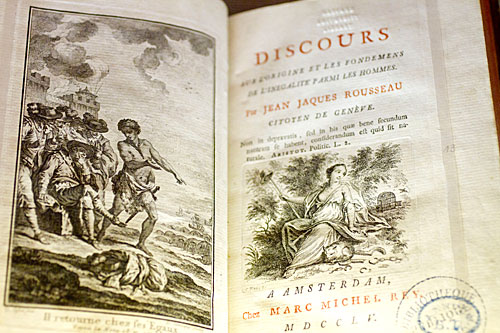
Jean-Jacques Rousseau
The year 2012 marks the 300th anniversary of Rousseau’s birth, which is currently being celebrated through a Houghton Library exhibit.
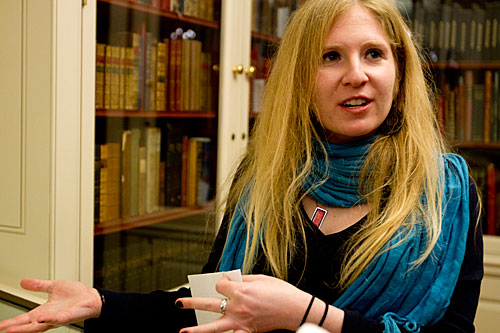
‘Rousseau and Human Rights’
It was graduate student Tali Zechory’s enthusiasm for Rousseau’s work that led her to serve as guest curator for the Houghton Library exhibit, “Rousseau and Human Rights.”
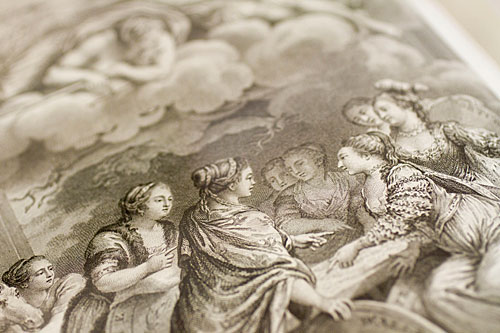
Alive and kicking
According to curator Tali Zechory, “Rousseau is very much alive and kicking,” and his work was recently cited by political figure Elizabeth Warren.
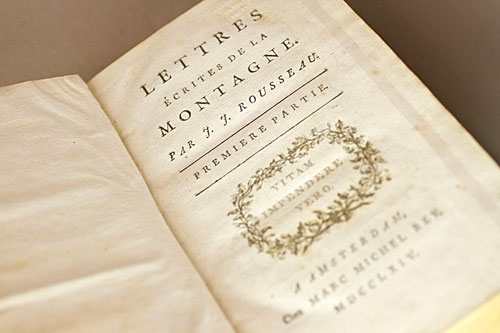
‘Kid in a candy store’
“The Houghton has such a rich collection,” said Talii Zechory. “I felt like a kid in a candy store! I’ve learned so much … it’s such a different experience to see and touch these books, rather than just reading Rousseau’s text in a modern anthology.”
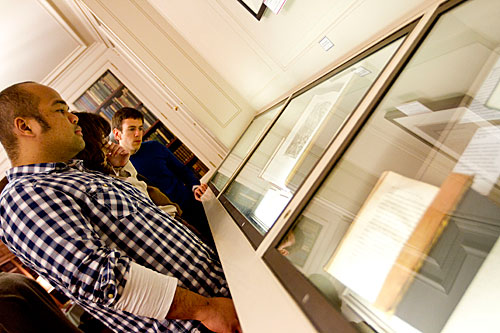
On display
The exhibit is divided into three areas: political principles; appeals of, and to, the universal; and pity, empathy, and the sentiment of humanity.
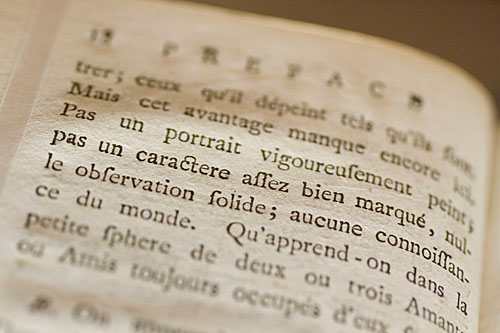
Up close and personal
In addition to showing several first editions of Rousseau’s publications, the exhibit also includes letters from that period. One such letter, sent in 1758 to Rousseau’s publisher, requested that Rousseau’s work be made broadly available to “all citizen readers.”
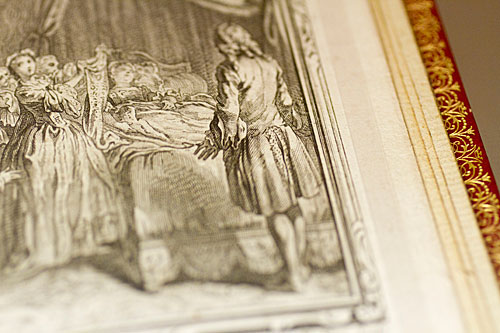
Picture this
“For guest curators, the most difficult part is taking the wealth of material available at the Houghton and focusing on just 10 or 15 items,” said Leslie Morris, curator of modern books and manuscripts.




